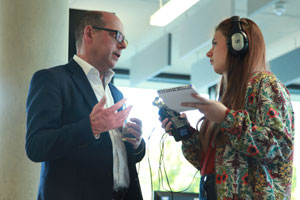
The BBC's Nick Robinson speaks to one of the journalism students
First-year multimedia journalism students at the University have made their first venture into radio broadcasting, making a half-hour programme on the EU Referendum for local station Colne Radio.
While most Essex students were winding down post-exams, the small journalism cohort were interviewing leading figures from the remain and leave campaigns including local MP Bernard Jenkin and former Colchester MP Sir Bob Russell.
They also caught up with former Labour Foreign Secretary Rt Hon Lord Owen and Boris Johnson’s former economic adviser Dr Gerard Lyons when they spoke in the University’s EU Referendum debate.
And they took the opportunity to interview comedian, actor and activist Eddie Izzard when he visited the University on his Stand Up for Europe tour, and the BBC's Nick Robinson when he spoke at the Colchester Campus.
Their programme, Referendum, was broadcast by Wivenhoe-based Colne Radio on the internet on 20 June. It is available via their Listen Again service.
Proud Professor of Journalism and former BBC editor Jonathan Baker, explained that, in the first year of their course, the students concentrate on the core craft skills of journalism, and work mostly in print and online. They move on to radio and television work in their second year.
“But when Colne Radio offered us the opportunity to make a programme for them tied to the EU referendum, it seemed too good a chance to miss. After all, these votes only come around every 41 years,” he said.
“The cohort has worked flat out learning the basics of radio reporting and editing, doing interviews, researching issues and putting this programme together. It’s to their credit that they’ve been prepared to tackle such an ambitious project at such a time and with such energy.”
Student Lauren Dorling, who edited the programme, said: "The greatest challenfge and reward to come of the project was the fact we were thrown into the deep end. Our lecturers believed in our ability enough to know that, even though we had minimal experience in radio journalism, we would work hard and take on the project with enthusiasm and determination - and we did."
The cohort’s first broadcast success coincides with their course achieving accreditation from the Broadcast Journalism Training Council. Only a year after the launch of the course, the National Council for the Training of Journalists has also confirmed its initial accreditation and extended it for another two years.